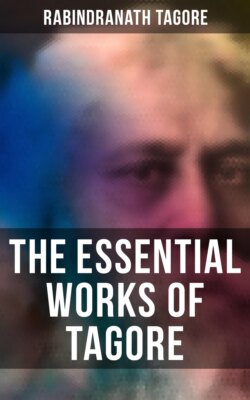Читать книгу The Essential Works of Tagore - Rabindranath Tagore - Страница 373
На сайте Литреса книга снята с продажи.
VII
ОглавлениеAt first I suspected nothing, feared nothing; I simply felt dedicated to my country. What a stupendous joy there was in this unquestioning surrender. Verily had I realized how, in thoroughness of self-destruction, man can find supreme bliss.
For aught I know, this frenzy of mine might have come to a gradual, natural end. But Sandip Babu would not have it so, he would insist on revealing himself. The tone of his voice became as intimate as a touch, every look flung itself on its knees in beggary. And, through it all, there burned a passion which in its violence made as though it would tear me up by the roots, and drag me along by the hair.
I will not shirk the truth. This cataclysmal desire drew me by day and by night. It seemed desperately alluring,—this making havoc of myself. What a shame it seemed, how terrible, and yet how sweet! Then there was my overpowering curiosity, to which there seemed no limit. He of whom I knew but little, who never could assuredly be mine, whose youth flared so vigorously in a hundred points of flame—oh, the mystery of his seething passions, so immense, so tumultuous!
I began with a feeling of worship, but that soon passed away. I ceased even to respect Sandip; on the contrary, I began to look down upon him. Nevertheless this flesh-and-blood lute of mine, fashioned with my feeling and fancy, found in him a master- player. What though I shrank from his touch, and even came to loathe the lute itself; its music was conjured up all the same.
I must confess there was something in me which .... what shall I say? .... which makes me wish I could have died!
Chandranath Babu, when he finds leisure, comes to me. He has the power to lift my mind up to an eminence from where I can see in a moment the boundary of my life extended on all sides and so realize that the lines, which I took from my bounds, were merely imaginary.
But what is the use of it all? Do I really desire emancipation? Let suffering come to our house; let the best in me shrivel up and become black; but let this infatuation not leave me,—such seems to be my prayer.
When, before my marriage, I used to see a brother-in-law of mine, now dead, mad with drink,—beating his wife in his frenzy, and then sobbing and howling in maudlin repentance, vowing never to touch liquor again, and yet, the very same evening, sitting down to drink and drink,—it would fill me with disgust. But my intoxication today is still more fearful. The stuff has not to be procured or poured out: it springs within my veins, and I know not how to resist it.
Must this continue to the end of my days? Now and again I start and look upon myself, and think my life to be a nightmare which will vanish all of a sudden with all its untruth. It has become so frightfully incongruous. It has no connection with its past. What it is, how it could have come to this pass, I cannot understand.
One day my sister-in-law remarked with a cutting laugh: 'What a wonderfully hospitable Chota Rani we have! Her guest absolutely will not budge. In our time there used to be guests, too; but they had not such lavish looking after,—we were so absurdly taken up with our husbands. Poor brother Nikhil is paying the penalty of being born too modern. He should have come as a guest if he wanted to stay on. Now it looks as if it were time for him to quit.... O you little demon, do your glances never fall, by chance, on his agonized face?'
This sarcasm did not touch me; for I knew that these women had it not in them to understand the nature of the cause of my devotion. I was then wrapped in the protecting armour of the exaltation of sacrifice, through which such shafts were powerless to reach and shame me.
